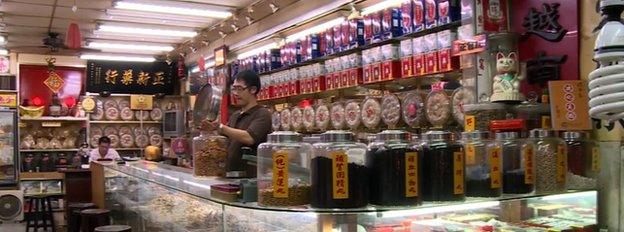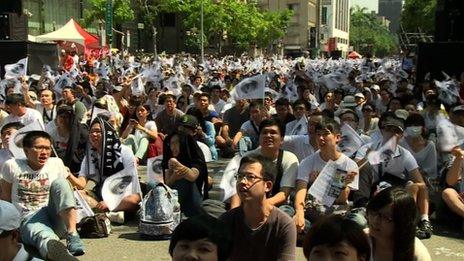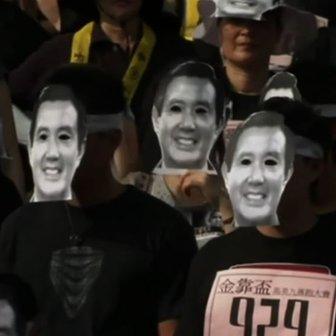Taiwan's services agreement with China triggers concerns
- Published

Some Taiwanese businesses fear the agreement with China will hurt their profitability and growth
For 40 years, Wu Wei-tung's family has operated a traditional Chinese medicine wholesale and retail business on Taipei's well-known Dihua Street.
The shop is stacked with cans and jars full of herbs, and it employs Mr Wu, his brother and his father.
But they fear it may soon have to shut down.
That is because a trade agreement, signed between Taiwan and mainland China earlier this year, could see Chinese medicine suppliers selling directly to shops in Taiwan.
Right now, businesses such as Mr Wu's import most of their medicine from the mainland. But Mr Wu says if the agreement is approved it will be hard for businesses like his to survive.
"Most Chinese medicine comes from China, so their costs and prices will definitely be lower than ours," he says.
"If they're allowed to import and do wholesale here, we will be driven out of business."
'More free trade'
The deal is the most significant of its kind signed between the two former rivals since 2010 - when they agreed to a pact reducing or eliminating tariffs on hundreds of types of exported products.
Commonly referred to as the services trade agreement, it would allow the two sides to invest much more freely in one another's services market.
Taiwan, though, appears to have benefited more from the deal than China.
China has opened up 80 types of industries in its booming services sector to Taiwanese companies, while Taiwan has opened up just 64 industry sectors, including Chinese medicine wholesale.
Businesses in Taiwan like banks, travel agents, hospitals, and securities firms, among others, will be able to provide more services across a wider area of China.
They will also be able to set up wholly owned businesses in China, or hold a majority stake in one, without having to find joint venture partners.
Company executives like Albert Pei from Lion Travel Service believe Taiwan's market is too small. They say it's crucial for its businesses to be able to reach Chinese consumers next door.
"We basically support more free trade," says Mr Pei, Lion Travel's general manager of strategic business planning.
"This trade agreement is a good step forward - and we hope both sides will remove more trade obstacles in the future so that free competition can happen in both markets."

There have been protests in Taiwan against the pact with China
Growing concerns
But in recent weeks, opposition against the agreement has been getting stronger and louder.
It intensified after President Ma Ying-jeou tried to oust Legislative Speaker Wang Jin-pyng for reportedly not doing enough to get the deal ratified by the legislature.
In June, the legislature decided to review the agreement item-by-item. And if any of the provisions are rejected, the whole agreement will be annulled.
Under the agreement, China would be allowed to open hotels, travel agencies, joint venture hospitals, retail stores, hair salons and other businesses in Taiwan.
But industry officials say Chinese investors are unlikely to be in a rush to come in as the market here is small and already saturated.
There is a growing perception, though, prevailing in a segment of Taiwanese society that Taiwan may become too dependent on China.
The worry is that such deals could lead to an influx of Chinese money and people, which would ultimately threaten the democratic island's independence and way of life.
"Some of the provisions in the agreement exceed World Trade Organization levels," says Lin Chun-hsien, spokesman for the main opposition Democratic Progressive Party.
"For example, if a Chinese company invests $300,000 (£186,000) here, they can transfer three Chinese workers here, and these workers can live here for several years.
"We're afraid that with such a low threshold, China will make fake investments so it can bring more of their people here."
Political agenda?
In his recent National Day address to Taiwan's people, President Ma indicated it was important for the island to approve the agreement and sign more free trade agreements with other countries.
He said Taiwan was already falling behind countries like South Korea in trade earnings and competitiveness.

Some have raised concerns over Mr Ma's policy of forging closer ties with China
Some suspect the president of being too close to China, though, and resent his administration for signing the trade deal without first consulting businesses that would be affected.
"President Ma Ying-jeou hasn't given any clear explanation of what kind of impact there will be on people and their livelihood," said a young protester out with thousands of others on 10 October for National Day.
"He's just trying to push through this agreement."
Local media have reported that both Beijing and President Ma are eager to see the deal approved.
For Mr Ma, the deal will not only provide a boost to Taiwan's economy, but also help take a further step towards achieving a key agenda of his presidency.
He wants to bring the two sides closer together, at least economically, and he wants to see lasting peace eventually cemented.
For Beijing, the goal is to also bring the two sides closer, but its ultimate aim is reunification.
And that is exactly what opponents of the trade deal do not want.
- Published18 October 2013
- Published23 September 2013
- Published10 August 2012